BIG INTERVIEW: Reuben Twijukye eyes Olympic glory
Jun 02, 2020
"Back in school, when I was running passing other athletes, one of the national coaches spotted my talent and the rest was history."

OLYMPIC GAMES
Hailing from Bugongi, Sheema district in western Uganda, Reuben Twijukye's life was changed when a national talent spotter saw him light up a sports day relay race at Makerere College School. He would go on to represent Uganda at the IAAF World Junior Championships in Grosseto Italy in 2004, where he reached the semi-finals of the 800m race.
The performance opened up scholarship opportunities for him in the US, leading to his leaving Uganda in 2005. Now, after finalizing studies with a PhD (Human Resource and Leadership Development) at the Louisiana State University (LSU) in May 2020, he feels all but ready to make the stringent 800m and 1,500m qualifying times for the rescheduled 2020 Summer Olympics before the window closes in June.
He previously missed out by a second, but the pain of coming up short has only fueled an unquenchable determination and zeal to lift Uganda's flag at the next Olympic summit in July 23 - August 8 next year. After joining the US at 18 years and now with a PhD, he spoke the New Vision's Samuel Sanya just after graduation, also called commencement in the US.
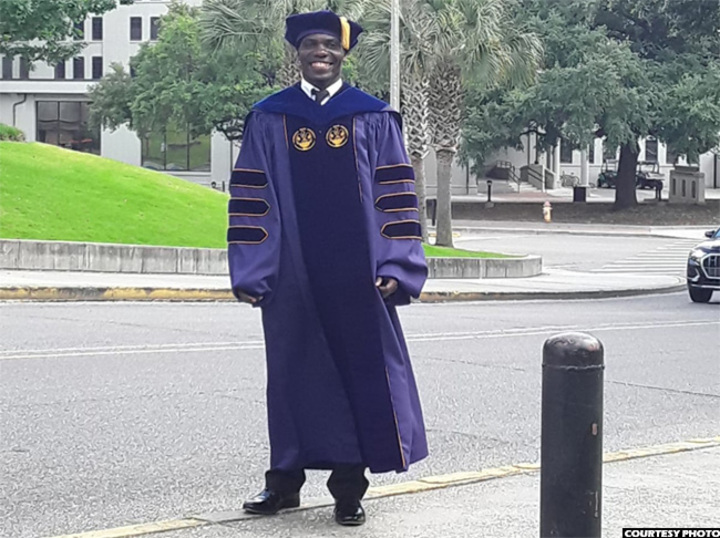
___________________________
Congratulations on the PhD. What does it feel like to be one of very few Ugandan sports personalities with a PhD?
It is a very humbling experience. Without the help of many people, it would have been impossible for me to be here today. Of course, the first on this list is my mother, who always told me when I was growing up that I could accomplish anything, so a part of this degree really belongs to her. She is the one who taught me to dream.
There have been many teachers along the way who have seen potential in me and encouraged me to pursue my dreams. These have been at every level - from primary school all the way to professors in my doctoral courses.
I really should have acknowledged God first in all of this because, if He had not given me the athletic ability to run, many of the academic opportunities would have still been dreams.
I cannot talk about important people without acknowledging my American family. When I first came to the US to run track at South Plains College, the Breitling family more or less adopted me as a member of their family. For an 18-year-old halfway around the world, it is impossible to overemphasize how much this meant to me.
I have to thank my best friend, Jeantyl Norze. We were in school together at LSU, and he and his wife made me part of their family. Also, when their little girl, Skylie, was born, I quickly became Uncle Reuben. Jeantyl has been on the faculty at the University of Nevada - Reno for the past year and not being able to be Uncle Reuben has been torture.
Also, I would like to recognize Dr. Reid Bates, the director of my school, for giving me a graduate assistantship that helped to keep me in school financially. Finally, my major professor, Dr. Mike Burnett, has been my mentor and cartographer showing the successful path through the programme.
So you see why I say it is humbling, because without all of these people and many others, I would not be here right now.
What attracted you to athletics?
The beauty of the sport, its challenges and health benefits. Running is a hard sport. It requires hard work, persistent and patience because it takes time to achieve results. I was able transfer these qualities to my educational journey and real life as well because that's what it takes to succeed in life. Additionally, health is wealth and running provides a variety of benefits. It improves your immunity, cognitive function, and reduces cognitive decline, it reduces the risk of many cancers, it improves mental health, it improves glucose regulation, and lowers risk of diabetes and pre-diabetes, it lowers your blood pressure, it helps you lose weight and keep it off, and it builds your self-esteem.
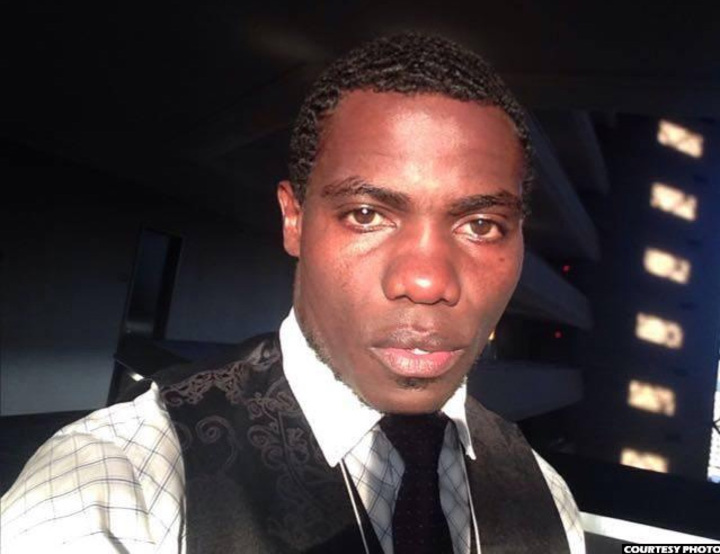
How did you evolve to reach your current level?
It was during the sports day competitions when I was in O' Level at Old Kampala S.S.S before joining A' Level at Makerere College. My house had won most of the events and I had just finished playing soccer and my house wanted someone to anchor the 4x400m relay. The house captain selected me. I brought my team from last to first while running in soccer boots and we won the overall house competition trophy.
When I was running passing other athletes, one of the national coaches spotted my talent and the rest was history, and I would go on to become 400m national champion twice.
What was your first international race and how did it feel?
In 2004 at the IAAF World Junior Championships in Grosseto Italy. I enjoyed great success on the international stage, as I was a semifinalist in the 800m representing Uganda. It felt great, I was able to gain international exposure competing on the world stage and it attracted many universities and colleges in the US to offer me a sports scholarship.
Have you managed to continue running competitively while studying in the US?
I was a member of the LSU track team for the period of my eligibility to participate in the NCAA. Since I finished my undergraduate degree and was no longer able to be part of the LSU team, I have not been able to attend very many actual competitive events. Finances have been a problem, but this has not interfered with me training. I maintain a very strict training schedule, and with that coupled with work and academics, my schedule for the past several years has been pretty full.
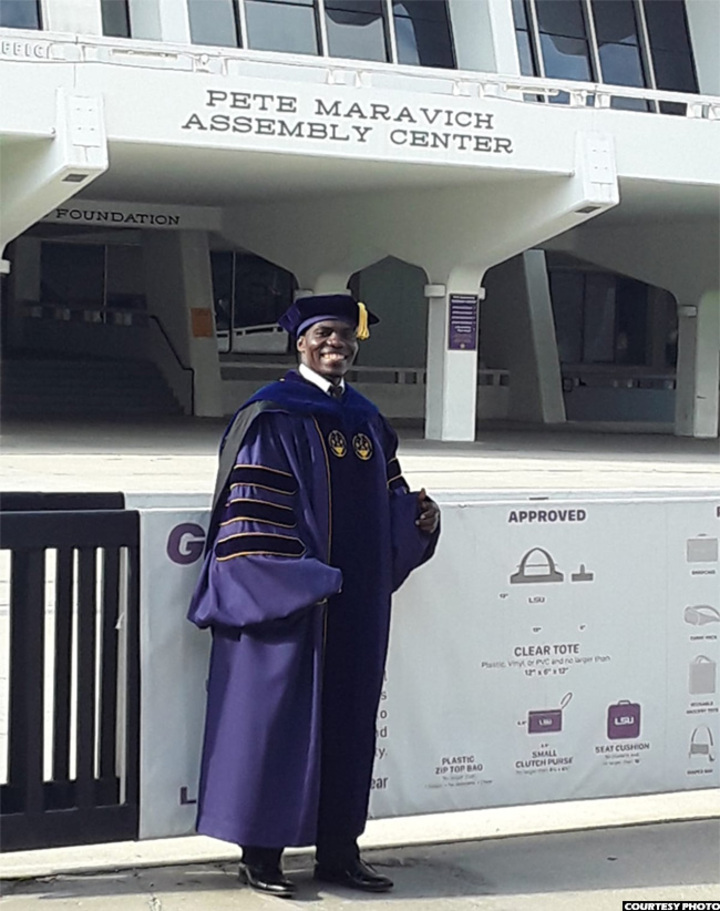
What, in your view, have been your proudest career moments?
When I represented Uganda at the IAAF World Junior Championships and when many universities and colleges in the US offered me sports scholarships. Second is when Dr. Reid Bates, the director of my school, gave me a graduate assistantship that helped to keep me in school financially. The other is the completion of my PhD programme.
You've set your sights on qualifying for the 1,500m and the 800m at the Tokyo 2020 Olympic Games, now set for 2021. How do you rate your qualification chances and why?
I believe that my chances are actually very good. There are a few reasons that I feel the way I do about this. First of all, I have never been in better running condition in my life. I have been working with a coach (trainer) that has helped me to better understand myself and how to get my best performance when I need it most. Originally, my intent was to compete in just the 800m, but as I prepared, I learned that my abilities are actually even better suited for the 1,500m. That is why I now plan to pursue both.
Finally, I have always honored God and my mother in all my accomplishments. I believe that God has opened the doors for me to achieve my two biggest dreams (one completed - the PhD - and one yet to come in 2021), and I believe that He will open this door as well as long as I continue to honor Him and to respect and show appreciation for those who help me along the way.
How has COVID-19 affected your Olympic plans?
Well, honestly it has thrown a bit of a wrench into my plans. I was hoping to complete my PhD in May, compete in Tokyo in the summer and start my academic career (hopefully in a tenure-track position) in the fall of 2020. Now, it looks as though I will have to find employment to pay the bills and finance my training until the time for the 2021 Olympics. I would love to stay in Baton Rouge, and I am exploring employment opportunities, but nothing is set at this time. I DO believe that God will open a door, or at least a window.
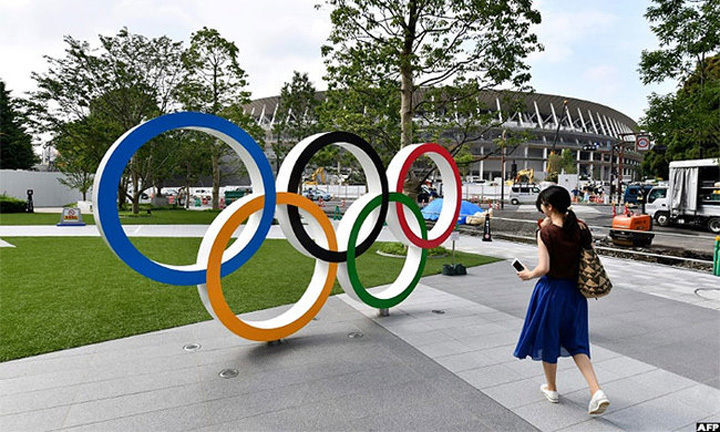
How did you feel when you missed qualification for the previous Olympics by one second? What did you learn from this that makes you better prepared this time round?
I was, of course, disappointed. But my disappointment was in myself. I felt like I had let down all those who had helped me to reach that point in the Olympic trials. However, I was not distraught. Thankfully, track is not an area of competition in which only the very young can be successful.
When I failed to qualify the first time, it made me more determined to be better prepared the next time that I had this opportunity, and I am. What I learned was that sometimes my plans and God's plans are not the same. I have sought to identify His plan for me, and I believe that His plan is for me to be in Tokyo in 2021.
If you weren't an athlete, what other sport would you be involved?
I presume that you mean from a recreational standpoint. I think I would still love to run, and I love soccer both as a spectator and as a participant. I also enjoy swimming, so I think I would probably participate in these sports. In the future, if God grants me children, I think I will derive great pleasure from helping them develop a love for these and other sports.
Tell us about your family. Are you married?
I am not married. In fact, my schedule for the past several years has not really afforded me much opportunity to date.
Actually, though, I do have several families: my mother and brothers and sisters back in our village in Uganda, my adopted family in Texas, Jeantyl and his wife and daughter (who were previously here in Baton Rouge), and my academic family at LSU.
Were your parents in Uganda happy with the idea of a young Reuben being an athlete?
At the beginning, it was a 'No! No! No!'. Like most parents in Uganda, my parents do not believe in sports as a career, especially in my native Bugongi, Sheema district. My parents were not happy with me as an athlete until I earned a sports scholarship to study in the US.
Which coaches and other people have had the greatest impact on your career?
Beatrice Ayikoru of the Uganda Athletics Federation (UAF) has been instrumental in my career. She gave me an opportunity to represent Uganda at the world stage. I thank Coach Mugiha, my high school coach at Makerere College. Coach Shaver of LSU Track and Field. Mark Elliot, my Former University coach. Coach Been South Plains College and finally, Moses Mpanga, a former Uganda national athlete and student athlete at Arizona State University.
What are the challenges of being an athlete outside Uganda, especially in the US?
Being far way from family, especially my mother and siblings, and lack of high altitude training.
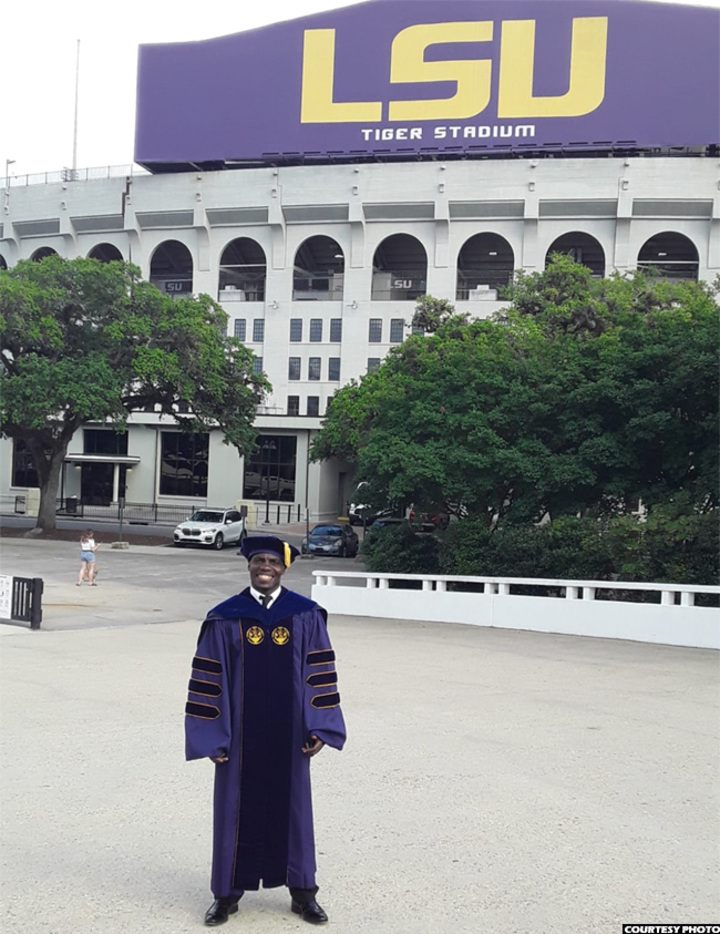
Outside athletics, what else do you do?
Teaching, doing research at the university and mentoring students.
What are your dreams? In the next five years, what do you hope to have achieved?
Well, I have told you that my big dreams for many years have been to earn a PhD and to compete in the Olympics. I have now added another dream - I have absolutely fallen in love with teaching. As I look back on my life thus far, I can see the positive impact that good teachers can have on people's lives. My major professor has told me that when his daughter told him that she wanted to be a teacher, he told her that if you are going to be a teacher, be a good one. That is what I have tried to do. I have had the opportunity to do some teaching both at the high school level and at the university level, and I am both excited and a bit overwhelmed by what I have seen good teachers do in the past. The really great ones make it look easy, but it is not easy.
I want to be a faculty member at a university that places great value on excellent teaching. I want to meet someone who shares my values and dreams, and get married. I want to have children - maybe three or four - and be the kind of parent for them that my parents were for me.
Unrealistic dreams?
No I don't think so.
Additionally, I would like to have a project that will assist athletes to develop their skills, and balance both sports and education. It will be a great opportunity to share what I have learned all over the years because there has been a myth that athletes cannot be scholars. Yet, it is possible. This will also stretch to educate Ugandans who are nonathletes, especially starting with primary students all way to the university Level. These students will be able to learn the benefits of exercising and eating healthy foods, living a healthy lifestyle and how they prevent them from noncommunicable diseases. More than 33% of all deaths in Uganda are caused by noncommunicable diseases (WHO, 2018). So as you can see, noncommunicable diseases in Uganda are a concern. A healthy body leads a healthy mind.
What is your day like?
I normally wake up at 6am for training. After training, I fix breakfast then I work on my research. At noon, I go for lunch, after which I normally finish up with my academic work and prepare for my second training. After my second training, I normally reach home at 7pm, fix dinner, reply emails from my students and head to bed at around 10pm.
What do you miss most about Uganda?
I love Uganda, and I also love America. It is my adopted country. I miss a lot of things, but there is one thing I miss the most: my family, especially my mother.
What advice do you have for Ugandans looking to emulate you?
First, find YOUR dream. Do not adopt my dream. To be really achievable, it must be yours.
Second, know in your heart that your dream is achievable.
Third, learn what it takes to reach your dream. If your dream requires a college degree, you should know that and prepare yourself to take the first step toward your dream.
Finally, stay focused. Write your dream on a big sheet of paper and put it on the wall in your room so that you see it every morning when you wake up and see it every night just before you fall asleep and remember to pray to God. And always remember that everything is possible regardless of your background because what is possible for one is possible for all people.
HIS LIST OF FAVORITES
Favorite meal: My favorite foods are brown rice, beans, baked chicken, spinnach and peanut butter. And sometimes posho and sweet potatoes. And all kinds of organic fruits and vegetables. I don't eat fast foods.
Favorite car: Range Rover.
Favorite movie: Think Like a Man
Social media: Facebook. I have Instagram but I don't use it. I have not been much into social media because teaching and research required most of my time!
